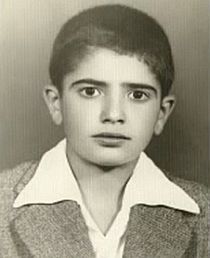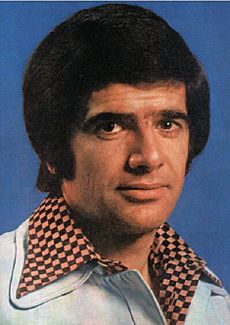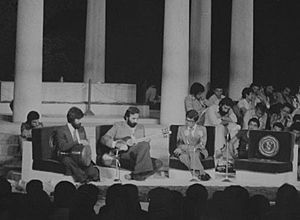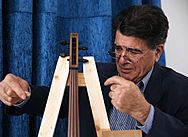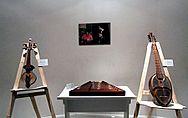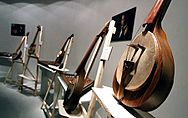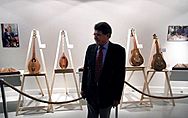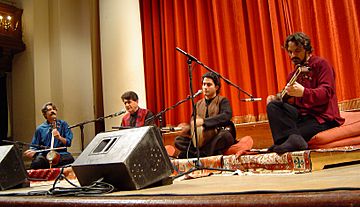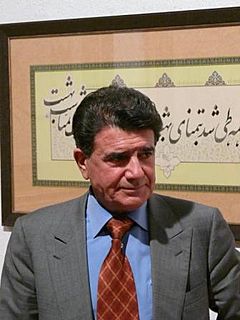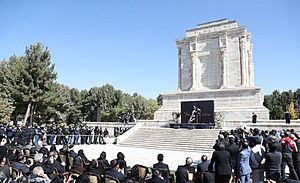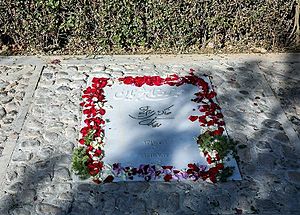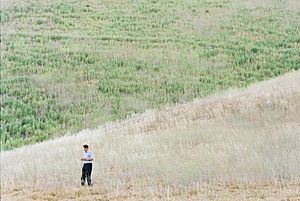Mohammad-Reza Shajarian facts for kids
Quick facts for kids
Ostad
Mohammad-Reza Shajarian
|
|
|---|---|
| محمدرضا شجریان | |
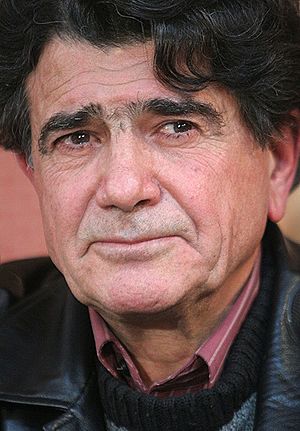
Shahjarian in 2007
|
|
| Born | 23 September 1940 Mashhad, Imperial Iran
|
| Died | 8 October 2020 (aged 80) Tehran, Iran
|
| Resting place | Tomb of Ferdowsi |
| Other names | Siavash Bidkani (before 1970s) |
| Education | Shah Reza School School of National Music |
| Alma mater | Tehran Supreme University |
| Occupation |
|
| Spouse(s) |
Farkhondeh Golafshan
(m. 1962; div. 1993)Katayoun Khansari
(m. 1995) |
| Children | 5, including Homayoun and Mojgan |
| Musical career | |
| Genres | Persian traditional music |
| Years active | 1959–2016 |
| Labels | Santur, Tonbak |
| Associated acts | Aref Ensemble |
| Signature | |
 |
|
Mohammad-Reza Shajarian (Persian: محمدرضا شجریان; 23 September 1940 – 8 October 2020) was a famous Iranian singer. He was known as a master (called Ostad) of Persian traditional music. He was also very good at Persian calligraphy (beautiful writing) and helped people through his humanitarian work.
Shajarian started singing in 1959 at Radio Khorasan. He became very popular in the 1960s because of his special singing style. He learned from many great teachers like Ahmad Ebadi and Nour-Ali Boroumand. He also studied the singing styles of older singers. He said that the famous tar player Jalil Shahnaz greatly influenced his singing.
Shajarian worked with many musicians, including Parviz Meshkatian and Hossein Alizadeh. He was known for his skill in the difficult traditional Dastgah style of music. In 1999, UNESCO gave him the Picasso Award. In 2006, he received the UNESCO Mozart Medal. In 2017, the Los Angeles Times called him the "Greatest living maestro of Persian classical music".
His music also included songs from different parts of Iran. These included Mazandarani, Azeri, Kurdish music, and Lur music.
Later in his life, he supported a movement called the Iranian Green Movement. He spoke out against the Iranian government. Because of this, he was not allowed to hold concerts or release new music.
Contents
Early life
Mohammad-Reza Shajarian was born on 23 September 1940 in Mashhad, Iran. His father, Mehdi, and his grandfather, Ali Akbar, were both qaris. A qari is someone who recites the Quran beautifully. His mother was Afsar Shahverdiani.
He was the oldest of five children. He began learning to sing at age five by reciting the Quran with his father.
Music career
Starting out
When he was 12, he started learning the Persian classical music system called the Radif. He did this without his father's permission. His father believed that studying music was against his religious beliefs. This might be why Shajarian first used the stage name "Siavash Bidakani." But he soon went back to using his real name.
Shajarian began his singing career in 1959 at Radio Khorasan. He became famous in the 1960s for his unique singing style. During his career, he taught at Tehran University. He also worked at National Radio and Television. He researched Persian music and made many recordings.
Music groups
Shajarian often performed with other musicians. He sang for the Masters of Persian Music group. In this group, he performed with his son Homayoun Shajarian. He also performed with other masters like Kayhan Kalhor and Hossein Alizadeh. He also performed with his daughter Mojgan Shajarian.
In 2008, he toured the world with the Ava Ensemble. This group included his son Homayoun, Hossein Behroozinia, Majid Derakhshani, Hossain Rezaeenia, and Saeed Farajpouri.
In 2012, he toured with the Shahnaz Ensemble. His daughter Mojgan was also part of this group. The group was named after the master tar musician Jalil Shahnaz. A part of the money from their concerts helped with Shahnaz's health care.
Teachers and students
Shajarian learned from many great teachers. These included Esmaeil Mehrtash, Ahmad Ebadi, and Nour-Ali Boroumand. He studied the singing styles of older singers like Hossein Taherzadeh and Qamar-ol-Moluk Vaziri. He also learned to play the santour (a type of hammered dulcimer). He took lessons from Jalal Akhbari and Faramarz Payvar. He also learned many old Persian songs from master Abdollah Davami.
Shajarian taught many students how to sing. Some of his famous students include:
- Iraj Bastami
- Shahram Nazeri
- Homayoun Shajarian
- Mohammad Esfahani
- Hamid Reza Noorbakhsh
Creating instruments
Shajarian also created many musical instruments. He showed his instruments in exhibitions. The first one was in May 2011, and the second in September 2013. These shows were held at the House of Artists.
Important works
Shajarian created many important musical works. Some of his famous albums and collaborations include:
- Raast-Panjgaah concert with Mohammad-Reza Lotfi (1976).
- Chehre be Chehre with Mohammad-Reza Lotfi (1977).
- Aastaan e Jaanaan with Parviz Meshkatian (1982).
- Bidaad with Parviz Meshkatian and the Aref Ensemble (1985).
- Nava – Morakkab Khaani with Parviz Meshkatian and the Aref Ensemble (1986).
- Zemestaan Ast with Hossein Alizadeh and Kayhan Kalhor (1999).
- Night, Silence, Desert with Kayhan Kalhor, based on folk music (2000).
- Bi To Be Sar Nemishavad with the Masters of Persian Music Ensemble (2002).
Speaking out
Shajarian's album Bidaad was released after he had not recorded music for three years. The songs on this album spoke about a beautiful place that had become troubled. He sang, "what happened?" He later explained that these lyrics were about the changes in Iran after the revolution. Many people felt this album spoke for those who felt unheard.
Shajarian supported the people who protested against the 2009 Iranian presidential election results. When Iran's president called the protesters "dust and trash," Shajarian told a BBC interviewer that he considered himself "the voice of dust and trash." He also asked the state TV and radio to stop playing his songs. He said his famous song "Iran, Ey Saraye Omid" (Iran, the land of Hope) did not fit the situation in his country.
After Shajarian spoke out, the state broadcaster stopped playing his music. This included his famous prayer, Rabbana, which was usually played every year during the Muslim fasting month of Ramadan. Many fans missed hearing it.
In an interview in 2016, Shajarian said his criticism was aimed at one person, not the entire government. He explained that music has sometimes been criticized by religious people. He believed that music itself is not wrong.
The lyrics of his song "Language of Fire" (2009) said, "Lay down your gun, Come, sit down, talk, hear. Perhaps the light of humanity will get through to your heart too." Many people thought these words were a message to the security forces during the protests.
He also shared a story about a concert in Stockholm. Some people in the audience started shouting against the government. Shajarian and his group stopped playing. He told the audience that they would only play one song for those who bought tickets, and then they would leave. He wanted to show that his music was not for political shouting.
Later life and passing
Shajarian gave some private interviews for a documentary called The Voice of Dust and Ash. In one part that was shared online, he said, "I am Mohammad Reza Shajarian, son of Iran. My voice is part of Iran's ancient culture, to remind the people of the world that we have had a culture of love, peace and friendship." These interviews were done before he announced his illness.
In March 2016, Shajarian shared that he had been battling kidney cancer for 15 years. He appeared with a shaved head in a video for Nowruz (Persian New Year).
Shajarian was hospitalized in January 2020 and had surgery. He was released in August but went back to the hospital in October.
Mohammad-Reza Shajarian passed away on 8 October 2020, at the age of 80, in Tehran. His body was taken to Mashhad and buried at the Tomb of Ferdowsi in Tus on 10 October.
Personal life
In 1962, Shajarian married Farkhondeh Golafshan. They had a son, Homayoun Shajarian, and three daughters: Farzaneh, Mojgan Shajarian, and Afsaneh. Afsaneh married Parviz Meshkatian. Shajarian and Golafshan divorced in 1993.
In 1995, he married Katayoun Khansari. They had one son, Ryan, who was born in Canada in 1997.
Awards and honors
|
|||||||||||||||||||||||||||||||||||||
| Totals | |||||||||||||||||||||||||||||||||||||
|---|---|---|---|---|---|---|---|---|---|---|---|---|---|---|---|---|---|---|---|---|---|---|---|---|---|---|---|---|---|---|---|---|---|---|---|---|---|
| Wins | 8 | ||||||||||||||||||||||||||||||||||||
| Nominations | 2 | ||||||||||||||||||||||||||||||||||||
|
Note
|
|||||||||||||||||||||||||||||||||||||
Shajarian received many awards for his music and art:
- NIRT Golden Cup (1977)
- Golden Picasso Medal (1999)
- Nominated for Grammy Award for Best Traditional World Music Album (2004, 2006)
- The UNESCO Mozart Medal (2006)
- Named one of NPR's 50 great voices (2010)
- French National Order of the Legion of Honour (2014)
- National Order of Merit (2014)
- Aga Khan Trust for Culture Award (2019)
Discography
Released music albums
Many of these albums are collaborations between Mohammad-Reza Shajarian and other artists. These include Shahram Nazeri or Homayoun Shajarian. Composers like Mohammad-Reza Lotfi and Parviz Meshkatian also worked on these albums.
- Robaeiat-e Khayyam (1972)
- Chavosh 1 (Be Yad-e Aref) (1977)
- Golbang-e Shajarian (1978)
- Chavosh 2 (1978)
- Sepideh (Chavosh 6) (1979)
- Chavosh 7 (1979)
- Jan Jan (Chavosh 9) (1979)
- Raz-e Del (1979)
- Entezar-e Del (1979)
- Peyvand-e Mehr (1984)
- Astan-e Janan (1985)
- Bidad (1985)
- Serr-e Eshgh (Mahoor) (1986)
- Nava, Morakabkhani (1986)
- Dastan (1988)
- Saz-e Ghese Goo (1988)
- Dood-e Ood (1989)
- Del-e Majnoon (1990–1991)
- Khalvatgozideh (1991)
- Payam-e Nasim (1991)
- Sarv Chaman (1991)
- Asman-e Eshgh (1991)
- Delshodegan (1992)
- Yad-e Ayyam (1992)
- Cheshmeye Noosh (1993)
- Bahariyeh (1994)
- Gonbad-e Mina (1994)
- Jan-e Oshagh (1995)
- Peygham-e Ahl-e Del (1995)
- Dar Khial (1996)
- Rosvaye Del (1996)
- Eshgh Danad (1997)
- Shab-e Vasl (1997)
- Moamaye Hasti (1997)
- Chehreh Be Chehreh (1998)
- Shab, Sokout, Kavir (1998)
- Aram-e Jan (1998)
- Ahang-e Vafa (1999)
- Booye Baran (1999)
- Zemestan Ast (2001)
- Bi To Besar Nemishavad (2002)
- Faryad (2002)
- Hamnava Ba Bam (2003)
- Jam-e Tohi (2004)
- Saz-e Khamoosh (2007)
- Sorood-e Mehr (2007)
- Ghoghaye Eshghbazan (2007)
- Konsert-e Mohammad-Reza Shajarian Va Gorooh-e Ava (2008)
- Konsert-e Mohammad-Reza Shajarian Va Gorooh-e Shahnaz (Randan-e Mast Va Morgh-e Khoshkhan) (2008)
- Ah Baran (2009)
- Zaban-e Atash (2009)
- Randan-e Mast (2009)
- Konsert-e Mohammad-Reza Shajarian Va Gorooh-e Shahnaz Dar Dubai (2010)
- Morgh-e Khoshkhan (2011)
- Ranghaye Taali (2013)
- Tarigh-e Eshgh (2016)
- Khorasaniat (2019)
- Deylaman (Unknown date)
Film title singer
- Love-stricken (1991)
- Abjad (2002)
- It is Winter (2005)
See also
 In Spanish: Mohammad Reza Shayarián para niños
In Spanish: Mohammad Reza Shayarián para niños
- National Iranian Symphony Orchestra
- Music of Iran
- List of Iranian musicians


